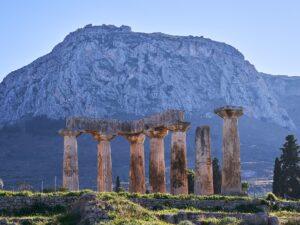The Greek islands collectively offer a profound pilgrimage experience, blending rich history, spiritual significance, and stunning natural beauty.
Ephesus, situated near modern-day Selçuk in Turkey but historically linked to the Greek world, is renowned for its extensive ruins of Greek and Roman architecture. Pilgrims can walk in the footsteps of St. Paul, who preached in the grand Theater of Ephesus, and visit the site of the Temple of Artemis, one of the Seven Wonders of the Ancient World.
Mykonos, known for its vibrant nightlife and picturesque Cycladic architecture, also holds historical importance with nearby Delos, an ancient UNESCO World Heritage site. Delos is believed to be the birthplace of Apollo and Artemis, making it a pilgrimage site where visitors can explore ancient temples and artifacts amidst serene island surroundings.
Patmos, part of the Dodecanese islands, is revered as the “Island of the Apocalypse,” where tradition holds that St. John the Apostle wrote the Book of Revelation in the Cave of the Apocalypse. The Monastery of St. John, perched atop a hill overlooking the island, houses relics and icons related to St. John, offering pilgrims a place for contemplation and spiritual renewal.
Crete, Greece’s largest island, is steeped in ancient Minoan history and offers pilgrims the chance to explore the Palace of Knossos, a significant archaeological site. Crete’s churches and monasteries, such as the Arkadi Monastery and the Toplou Monastery, reflect centuries of Orthodox Christian heritage, providing pilgrims with opportunities for prayer and reflection amidst breathtaking landscapes.
Santorini, known for its dramatic volcanic cliffs and stunning sunsets over the Caldera, offers pilgrims a unique spiritual experience amidst its picturesque setting. The island’s churches, including the Metropolitan Cathedral of Fira and the Monastery of Profitis Ilias, provide serene spaces for prayer and contemplation, while its ancient sites, like the prehistoric town of Akrotiri, offer insights into Santorini’s rich history and connection to early Christianity.
Together, these Greek islands invite pilgrims to immerse themselves in a journey of faith and discovery, exploring ancient religious sites, reflecting on biblical history, and experiencing the beauty of the Mediterranean landscape. Each island offers a unique blend of spiritual significance, historical exploration, and natural splendor, making them ideal destinations for pilgrims seeking to deepen their faith and connect with Christian heritage in the Mediterranean region.




